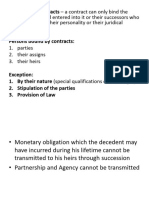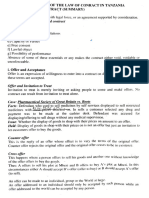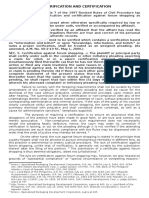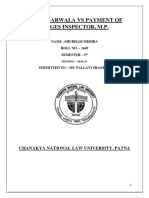Contracts Notes
Uploaded by
Edward Kenneth KungContracts Notes
Uploaded by
Edward Kenneth KungPhases of Contract Making
Generation preliminary/ preparatory process for the formation of the contract
Perfection b birth of the contract
o How?
By mere CONSENT (Art. 1315) in case of consensual contract
By DELIVERY (Art. 1316) in case of real contracts
Consummation fulfilment of the purpose for w/c the contract was constituted.
Principles of Contract
1. Freedom/ Liberty/ Autonomy Contracts (Art. 1306)
2. Mutuality of contracts (Art. 1308)
3. Effectivity / Relativity in Contracts (Art. 1311)
o GR: Contracts take effect only between the parties, their assigns and heirs
o Exception:
Stipulation Pour Autri (par. 2, Art. 1311)
REQUISITES:
Stipulation in favour of 3rd person should be a part, not the whole of
the contract;
Contracting parties must have clearly & deliberately conferred a
favour upon 3rd person;
Neither of the contracting parties bears the legal representation
authorization of the 3rd party
Acceptance of the benefit by the 3 rd person communicated to the
obligor before it could be revoked.
Example:
o Credit card Banks, buyer, merchant
o A & B are creditor-debtor. P1000000 loan. However, 250 of the loan
shall be paid to X, the creditor of the creditor
Art. 1312: In contracts creating real rights, third persons who come into
possession of the object of the contract are bound thereby, subject to the
provisions of the Mortgage Law & the Land Registration Laws. 7
Example: A loaned from B. A mortgaged his house to B. A sold house to C.
Can C be bound by the contract in case of non-payment?
o Yes, since B has the remedy to foreclose the property.
Art. 1313: Creditors are protected in cases of contracts intended to defraud them
Art. 1314: Any 3rd person who induces another to violate his contract shall be
liable for damages to the other contracting party.
Example: A induced B to violate his contract with C. Can C run after 3 rd
person (A)?
o
C can run after A and B for damages arising from:
A for tortuous acts
B for breach of contract
Q: May a person enter into a contract for another?
GR: No. (Art. 1317) No one may contract in the name of another.
o Exceptions:
When he is authorized by the other party
When he has, by law, a right to represent him
A contract entered into in the name of another by one who has 1) no authority or legal
representation or 2) who has acted beyond his powers shall be UNENFORCEABLE (you cannot go
to court to enforce it), UNLESS it is RATIFIED, expressly or impliedly
CONTRACTS
Essential Requisites:
CONSENT of the contracting parties
How manifested?
Art. 1319: By the MEETING of the OFFER and the ACCEPTANCE upon the
THING & the CAUSE.
o The offer must be certain and the acceptance absolute.
A qualified acceptance constitutes a counter-offer
Acceptance made by letter/telegram does not bind the offerer
except from the time it came to his knowledge. The contract, in
such a case, is presumed to have been entered into in the place
where the offer was made
o Art. 1322: An offer made through an agent is accepted from the
time acceptance is communicated to the agent
What is the effect of death/incapacity of the parties?
Art. 1323: An offer becomes INEFFECTIVE upon the death, civil interdiction,
insanity or insolvency of either party BEFORE acceptance is conveyed
Who may not give consent to a contract?
o Unemancipated minors
o Insane or demented persons
What is the nature of the contract entered into by these people? Voidable.
Contracts entered into during a lucid interval valid
Contracts agreed to in a state of drunkenness or during a hypnotic spell
voidable
A contract where consent is given through mistake, violence, intimidation, undue
influence or graud voidable
MISTAKE to be voidable (REQUISITES)
Should refer to the substance of the thing w/c is the object of the
contract OR 2) to those conditions w/c have principally moved one
or both parties to enter into the contract
Must be substantial
Serious and important
VIOLENCE serious or irresistible force is employed
INTIMIDATION reasonable and well-grounded fear of imminent and grave
evil upon the person and property of one of the contracting parties, his
spouse, descendants/ascendants.
UNDUE INFLUENCE when a person takes improper advantage of his
power over the will of another, depriving the latter of a reasonable
freedom of choice
o Factors to be considered
Confidential, family, spiritual & other relations between the
parties
Mental weakness
Ignorance
Financial distress of the one alleged to be influenced
FRAUD
o Requisites
Insidious words/machinations must be employed by one of
the contracting parties
Must be serious
Must induce the other party to enter into the contract
Must not have been employed by both contracting parties or
by a 3rd person
o Art. 1339: Failure to disclose facts, when there is a duty to reveal
them, as when the parties are bound by confidential relations
Fraud
o Art. 1340: The usual exaggerations in trade, when the other party
had an opportunity to know the facts are NOT in themselves
FRAUDULENT.
o Art. 1341: A mere expression of an opinion does NOT signify FRAUD,
UNLESS made by an EXPERT and THE OTHER PARTY HAS RELIED on
the formers special knowledge.
Art. 1332: When one of the parties is unable to read, or if the contract is in a
language not understood by him, and mistake or fraud is alleged, the person
enforcing the contract must show that the terms thereof have been fully
explained to the former
o
Art. 1345: Simulation of a contract
Absolute: parties do not intend to be bound at all VOID
Relative: When the parties conceal their true agreement when it does not prejudice a 3 rd
person and is not intended for any purpose contrary to law, morals, good customs, public order
or public policy BINDS the parties to their real agreement
OBJECT certain w/c is the subject matter of the contract
Within the commerce of men: susceptible of appropriation and transmissible from
one person to another
Real or possible: Should exist at the moment of the celebration of the contract or
can exist subsequently or in the future
Licit: not contrary to law, morals, good customs, public order or public policy
Determinate or at least possible of determination, as to its kind
CAUSE of the obligation w/c is established
Art. 1350: In onerous contracts, the cause is to be understood to be for each
contracting party, the prestation or promise of a thing or service by the other; in
remuneratory ones, xxx
What is an OPTION CONTRACT?
o When the offerer has allowed the offeree a certain period to accept, the offer may be
withdrawn at any time before acceptance by communicating such withdrawal, except
when the option is founded upon a consideration as something paid or promised (money
or undertaking)
OPTION contract granting a person the privilege, to buy or not to buy, certain
objects, at any time w/in the agreed period, at a fixed price.
Will option money form part of the purchase price?
GR: No. Option money is separate and distinct from the purchase price
o Exception: If there is an agreement that option money will become
part of earnest money
o Next step: Execution of Deed of Absolute Sale
o An option is a preparatory contract in w/c 1 party grants to another, for a fixed period &
at a determined price, the privilege to buy or sell, or to decide whether or not to enter
into a principal contract. It must be supported by a consideration distinct from the price.
It is a separate and distinct contract from that w/c the parties may enter upon the
consummation of the option
Art. 1356: FORM OF CONTRACTS
GR: OBLIGATORY, in whatever form, provided all the essential requisites for their validity are
present
o Exceptions:
When the law requires that a contract be in some form in order to be valid or
enforceable, that requirement is absolute and indispensable
Formalities w/c are required for validity of contracts
o In writing
Donation of personal property which exceeds P5k
Sale of real property by an agent
Antichresis
Interest of loan of money
o Public instrument
Donation and acceptance of real property
Partnership where immovable property was contributed
Art. 1358: For enforceability/convenience/greater security of
the parties (NOT FOR VALIDITY BUT FOR ENFORCEABILITY)
Acts and contracts which have for their object the creation,
transmission, modification or extinguishment of real rights
over immovable property; sales of real property or of an
interest therein are governed by articles 1403, No. 2, and
1405;
The cession, repudiation or renunciation of hereditary rights
or of those of the conjugal partnership of gains;
The power to administer property, or any other power
which has for its object an act appearing or which should
appear in a public document, or should prejudice a third
person;
The cession of actions or rights proceeding from an act
appearing in a public document.
If A and B entered into a contract of sale of real property, is it valid?
o Yes as between the contracting parties
o But it is unenforceable in case of dispute.
Art. 1359: Reformation of instruments
Requisites
o There must be a meeting of the minds upon the contract
o Instrument evidencing the contract does not express the true agreement
o Failure of the instrument to express the agreement must be due to mistake, fraud,
inequitable conduct or accident
When proper?
o Mutual mistake of the parties
o One acted with mistake; other acted fraudulently
o Mistake by one, concealment by another
o Ignorance, lack of skill, negligence, or bad faith on the part of one drafting the instrument
o Mortgage/pledge but instrument states absolute sale or w/ right of repurchase
When not allowed
o Simple donations inter vivos when no condition is imposed
o Wills
o When the real agreement is void
Art. 1370. Interpretation of contracts
If the terms of a contract are clear and leave no doubt upon the intention of the contracting
parties, the literal meaning of its stipulations shall control
If the words appear to be contrary to the evident intention of the parties, the latter shall prevail
over the farmer
Art. 1377: The interpretation of obscure words or stipulations in a contract shall not favour the
party who caused the obscurity
o Is a contract of adhesion void?
GR: No.
Exception: If the parties are not on equal terms. If inequality is apparent, it
can be nullified
VALID CONTRACTS
1. Strictly comply with all legal requirements as to consent, object and cause (Art. 1318)
2. Entered into during a lucid interval (art. 1328)
3. Relatively simulated contracts w/c do not prejudice a 3 rd person and not intended for a purpose
contrary to law, morals, good customs, public order or public policy (art. 1346)
4. In indivisible contracts, legal terms may be enforced if same can be separated from illegal
provisions (art. 1420)
RESCISSIBLE CONTRACTS
Valid until rescinded (art. 1380)
Economic/financial injury or damage to contracting party or 3 rd person (art. 1381)
o May be assailed even by a 3rd person injured/ defrauded (art. 1383(
o Why?
Lesion by more than of the value of the object against
Ward by guardian
Absentee by representative
In fraud of creditors
Entered into by defendant over objects under litigation w/out knowledge/approval
of litigants or of competent judicial authority
Other contracts specially declared by law to be subject to rescission
Payments made in a state of insolvency
Cannot be cured by ratification
Action for rescission is SUBSIDIARY
Only to the extent necessary to cover the damages caused
Effect: mutual restitution of object & cause
o Not applicable if object is legally in the possession of a 3 rd person who did not act in bad
faith (art. 1385)
Remedy: Payment of damages by the one who caused the loss
o Effects of rescission retroact to the date the action for rescission was instituted
PERIOD TO FILE ACTION FOR RESCISSION: 4 years from:
o Termination of guardianship
o Time domicile of absentee is known (art. 1389)
VOIDABLE
Valid until annulled;
o One party incapable of giving consent to contract
o Consent vitiated by mistake, violence, intimidation, undue influence or fraud (Art. 1390)
o Contracts entered in a state of drunkenness or during a hypnotic spell (Art. 1328)
Susceptible of ratification (Art. 1390)
o Ratification cleanses contract from all defects (Art. 1396)
o Ratification retroacts to constitution of contract (Art. 1396)
o Ratification expressly or tacitly (Art. 1393)
o Ratification may be effected by guardian (Art. 1394)
o Ratification extinguishes action to annul contract (Art. 1392)
o Ratification needs no conformity of other party who has no right to bring action for
annulment (Art. 1395)
May be assailed only by a contracting party (obliged principally or subsidiarily)
o Except
Capacitated party as to the incapacity of other party
Those who exerted intimidation or undue influence or employed raud (Art. 1397)
Mutual restoration of object and cause
o Incapacitated person not compelled to restitute except insofar as he has been benefitted
by the thing or price received (Art. 1399)
o Loss of the thing thru fault of the person obliged to return said thing, he shall return fruits
received and value of the things at the time of loss (art. 1400)
o Action for annulment is extinguished upon loss of object through fraud or fault of person
who has a right to institute annulement (Art.1401)
PERIOD TO FILE ANNULMENT: 4 years
o Time defect of consent ceases
o Time guardianship ceases
o Time of discovery of mistake or fraud.
UNENFORCEABLE
Cannot be enforced by court action unless ratified (Art. 1403)
o Entered into w/out authority or w/out legal representation or beyond authority granted
o Did not comply with the Statute of Frauds:
Agreement not to be performed w/in a year
Special promise to answer for the debt, default or miscarriage of another
Agreement made in consideration of marriage, other than a mutual promise to
pay
Agreement for the sale of goods not less than P500
Lease for more than 1 year or sale of real property
Representation as to the credit of a person
o Both contracting parties incapable of giving consent to a contract
Susceptible of ratification (Art. 1405)
o Failure to object to presentation of oral evidence
o Acceptance of benefits
May be assailed only by a contracting party
VOID
Do not produce any effect
One/some of the essential requisites of a valid contract are lacking in fact or in law (Art. 1409)
o Cause, object or purpose is contrary to law, morals, good customs, public order, or public
policy
o Absolutely simulated/fictitious contract
o Cause or object did not exist at the time of the transaction
o Those whose object is outside the commerce
o S
o S
o S
o Expressly prohibited or declared by law
Not susceptible of ratification
Right of action or defense cannot be waived
Right of action does not prescribe (Art. 1410)
May be assailed not only by a contracting party but even by a 3 rd person whose interest is
directly affected (Art. 1421)
You might also like
- Rule On Custody of Minors and Writ of Habeas Corpus100% (2)Rule On Custody of Minors and Writ of Habeas Corpus5 pages
- BL 02 - Contracts Lecture Notes - SupplementaryNo ratings yetBL 02 - Contracts Lecture Notes - Supplementary8 pages
- OBLICON STUDY GUIDE Page 329-330 I. Definitions Define or Give The Meaning of The FollowingNo ratings yetOBLICON STUDY GUIDE Page 329-330 I. Definitions Define or Give The Meaning of The Following20 pages
- Att 1362544744505 Characteristic of ContractNo ratings yetAtt 1362544744505 Characteristic of Contract4 pages
- A. Autonomy of Contract-The Contracting Parties May Establish SuchNo ratings yetA. Autonomy of Contract-The Contracting Parties May Establish Such12 pages
- A Guarantor Insures The Solvency of The Debtor While A Surety Is An Insurer of The Debt ItselfNo ratings yetA Guarantor Insures The Solvency of The Debtor While A Surety Is An Insurer of The Debt Itself5 pages
- General Provisions (Contracts) - ObliconNo ratings yetGeneral Provisions (Contracts) - Oblicon7 pages
- Contractsreviewer Oblicon/ Dean AligadaNo ratings yetContractsreviewer Oblicon/ Dean Aligada18 pages
- Art. 1305. Contract, Defined: I. General ProvisionsNo ratings yetArt. 1305. Contract, Defined: I. General Provisions7 pages
- Contracts:: Contracts (Except Real Contracts)No ratings yetContracts:: Contracts (Except Real Contracts)6 pages
- 9234 - Supplementary Notes - Law On ContractsNo ratings yet9234 - Supplementary Notes - Law On Contracts5 pages
- C. Independent Contractors and Labor-Only Contractors: NotesNo ratings yetC. Independent Contractors and Labor-Only Contractors: Notes1 page
- Part II. Issues in M&A A) Public CompaniesNo ratings yetPart II. Issues in M&A A) Public Companies2 pages
- Facts Issues Ruling: Quezon City vs. ABS-CBN Broadcasting Corporation (October 6, 2008)No ratings yetFacts Issues Ruling: Quezon City vs. ABS-CBN Broadcasting Corporation (October 6, 2008)1 page
- In The Matter of The Probate of The Last Will and Testament of The Deceased Brigido AlvaradoNo ratings yetIn The Matter of The Probate of The Last Will and Testament of The Deceased Brigido Alvarado3 pages
- Section 247. General Provisions. - : Sections 247-252, Tax CodeNo ratings yetSection 247. General Provisions. - : Sections 247-252, Tax Code2 pages
- Organizational Behavior Why Is Org Bev Important To Me As A Proprietor?No ratings yetOrganizational Behavior Why Is Org Bev Important To Me As A Proprietor?1 page
- Tobacco. - The Financial Support Given by The National Government For The BeneficiaryNo ratings yetTobacco. - The Financial Support Given by The National Government For The Beneficiary1 page
- Quezon City vs. ABS-CBN Broadcasting Corporation (October 6, 2008)No ratings yetQuezon City vs. ABS-CBN Broadcasting Corporation (October 6, 2008)1 page
- Violation of Verification and Certification100% (1)Violation of Verification and Certification6 pages
- The Wall Street Journal Complete Estate Planning Guidebook by Rachel Emma Silverman - Excerpt50% (4)The Wall Street Journal Complete Estate Planning Guidebook by Rachel Emma Silverman - Excerpt32 pages
- Patient'S Rights and Responsibilities: Dr. Eutiquio Ll. Atanacio Jr. Memorial Hospital IncNo ratings yetPatient'S Rights and Responsibilities: Dr. Eutiquio Ll. Atanacio Jr. Memorial Hospital Inc8 pages
- The Federal Zone: Cracking The Code of Internal Revenue93% (15)The Federal Zone: Cracking The Code of Internal Revenue181 pages
- Sara Lee Philippines, Inc. vs. MacatlangNo ratings yetSara Lee Philippines, Inc. vs. Macatlang2 pages
- PingBills - Senate Bill 1310: Amending RA 6975 (Internal Affairs Service of The PNP)No ratings yetPingBills - Senate Bill 1310: Amending RA 6975 (Internal Affairs Service of The PNP)8 pages
- Setting Aside and Variation of Judgments and OrdersNo ratings yetSetting Aside and Variation of Judgments and Orders4 pages
- Officialgazette - gov.Ph-Q and A The Comprehensive Agrarian Reform ProgramNo ratings yetOfficialgazette - gov.Ph-Q and A The Comprehensive Agrarian Reform Program2 pages
- Saludo, Jr. vs. Philippine National Bank G.R. No. 193138, August 20, 2018No ratings yetSaludo, Jr. vs. Philippine National Bank G.R. No. 193138, August 20, 20182 pages
- Republic Act No 10173 (Data Privacy Act)No ratings yetRepublic Act No 10173 (Data Privacy Act)22 pages
- Elements of Consideration: Consideration: Usually Defined As The Value Given in Return ForNo ratings yetElements of Consideration: Consideration: Usually Defined As The Value Given in Return For8 pages
- Module 1 Professional Conduct Ethical StandardNo ratings yetModule 1 Professional Conduct Ethical Standard10 pages
- Rule On Custody of Minors and Writ of Habeas CorpusRule On Custody of Minors and Writ of Habeas Corpus
- OBLICON STUDY GUIDE Page 329-330 I. Definitions Define or Give The Meaning of The FollowingOBLICON STUDY GUIDE Page 329-330 I. Definitions Define or Give The Meaning of The Following
- A. Autonomy of Contract-The Contracting Parties May Establish SuchA. Autonomy of Contract-The Contracting Parties May Establish Such
- A Guarantor Insures The Solvency of The Debtor While A Surety Is An Insurer of The Debt ItselfA Guarantor Insures The Solvency of The Debtor While A Surety Is An Insurer of The Debt Itself
- Art. 1305. Contract, Defined: I. General ProvisionsArt. 1305. Contract, Defined: I. General Provisions
- Life, Accident and Health Insurance in the United StatesFrom EverandLife, Accident and Health Insurance in the United States
- C. Independent Contractors and Labor-Only Contractors: NotesC. Independent Contractors and Labor-Only Contractors: Notes
- Facts Issues Ruling: Quezon City vs. ABS-CBN Broadcasting Corporation (October 6, 2008)Facts Issues Ruling: Quezon City vs. ABS-CBN Broadcasting Corporation (October 6, 2008)
- In The Matter of The Probate of The Last Will and Testament of The Deceased Brigido AlvaradoIn The Matter of The Probate of The Last Will and Testament of The Deceased Brigido Alvarado
- Section 247. General Provisions. - : Sections 247-252, Tax CodeSection 247. General Provisions. - : Sections 247-252, Tax Code
- Organizational Behavior Why Is Org Bev Important To Me As A Proprietor?Organizational Behavior Why Is Org Bev Important To Me As A Proprietor?
- Tobacco. - The Financial Support Given by The National Government For The BeneficiaryTobacco. - The Financial Support Given by The National Government For The Beneficiary
- Quezon City vs. ABS-CBN Broadcasting Corporation (October 6, 2008)Quezon City vs. ABS-CBN Broadcasting Corporation (October 6, 2008)
- The Wall Street Journal Complete Estate Planning Guidebook by Rachel Emma Silverman - ExcerptThe Wall Street Journal Complete Estate Planning Guidebook by Rachel Emma Silverman - Excerpt
- Patient'S Rights and Responsibilities: Dr. Eutiquio Ll. Atanacio Jr. Memorial Hospital IncPatient'S Rights and Responsibilities: Dr. Eutiquio Ll. Atanacio Jr. Memorial Hospital Inc
- The Federal Zone: Cracking The Code of Internal RevenueThe Federal Zone: Cracking The Code of Internal Revenue
- PingBills - Senate Bill 1310: Amending RA 6975 (Internal Affairs Service of The PNP)PingBills - Senate Bill 1310: Amending RA 6975 (Internal Affairs Service of The PNP)
- Setting Aside and Variation of Judgments and OrdersSetting Aside and Variation of Judgments and Orders
- Officialgazette - gov.Ph-Q and A The Comprehensive Agrarian Reform ProgramOfficialgazette - gov.Ph-Q and A The Comprehensive Agrarian Reform Program
- Saludo, Jr. vs. Philippine National Bank G.R. No. 193138, August 20, 2018Saludo, Jr. vs. Philippine National Bank G.R. No. 193138, August 20, 2018
- Elements of Consideration: Consideration: Usually Defined As The Value Given in Return ForElements of Consideration: Consideration: Usually Defined As The Value Given in Return For













































































































